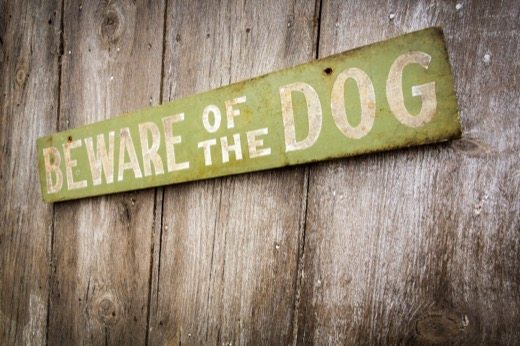Protecting Yourself From Dog Bites
The Centers for Disease Control and Protection (CDC) has issued a report on protecting yourself from dog bites. According to that report, in the United States approximately 4.5 million dog bites occur each year. Making it even worse, roughly one in five of those dog bites will become infected. It is important that you take steps to avoid being bit by a dog. In the event you are bit, it is also important to treat it appropriately to avoid infection.
In the United States, dogs are in our homes, and play with our children. Dogs are proven to reduce stress, and they have been shown to increase the amount we exercise. However, dogs do bite humans. This can cause nerve damage, pain and infection. With just a few precautions, you can greatly reduce your chances of being bitten by a dog.
How Can I Prevent A Dog Bite?
If you want to avoid being bitten by a dog, there are some simple steps you can take. Here are some do’s and don’ts as described by the CDC:
Do’s:
If the dog came from a house, let an adult at the home know if their dog is behaving strangely;
Stay still if an unfamiliar dog comes toward you; and
If you are knocked down by a dog, curl into a ball, tuck your head, put your hands over your neck and ears.
Don’ts:
Bother a dog that is caring for her puppies, a dog that is sleeping, or a dog that is eating;
Approach a dog you are not familiar with in the first place;
Turn and flee from a dog;
Touch a dog before it has had a chance to see you and sniff you;
Make loud noises or panic;
Allow your dog to be aggressive toward other unfamiliar dogs; or
Allow small children to play with even a familiar dog unsupervised.
Which People Are Most Likely to be Bitten By a Dog?
According to the CDC, the following people are most likely to be bitten by a dog:
Children. The age group most at risk are children ages five to nine. Dog bites to children are more likely to require medical attention than dog bites to adults.
Men. Statistics show that dogs are more likely to bite men than women.
Where Do Dog Bites Occur Most Frequently?
Interestingly, most dog bites – over half – occur in the home by dogs known by the victim of the dog bite. Clearly, having a dog in the house increases the likelihood of a dog bite in both children and adults. Further, additional dogs in the house increases the likelihood of a dog bite occurring in the household. For example, according to the CDC, adults that have two or more dogs in the house are five times more likely to be bit by a dog than adults that have no dogs in the home.
What Should I Do if I am Approached by an Unfamiliar Dog?
There are steps you can take to avoid an interaction with an unfamiliar dog. The CDC recommends the following:
Do not make eye contact with the dog;
Do not move;
Remain calm and do not panic;
Using a firm voice, say “Go Home” or “No”;
Turn your body to the side – some dogs may think you are being aggressive if you face them, like you are trying to “square off”;
If you think the dog may attack, put your hands on your neck with your elbows in; and
Either back away slowly or wait for the dog to pass by.
What if I am Attacked or Bitten By a Dog?
If the worst case scenario occurs and you are attacked or bitten by a dog, the CDC makes the following recommendations to minimize the harm to you:
Try to protect yourself by using anything you have on hand. This could include a jacket, purse or bag;
As stated above, curl up with your head tucked in and your hands on your neck and ears if you are knocked down;
Once you are in a safe location you need to tend to any wounds. Do this by washing immediately with soap and water. If necessary seek medical attention, especially if:
The wound is serious. This would include: exposed muscle or bone, bleeding that cannot be stopped, extreme pain and loss of use;
If the bite is deep and you have not had a tetanus shot in the last five years; or
If you develop a fever or the wound becomes swollen, warm, red, or painful.
Contact your local police department or animal control agency to report the incident. If you are bitten by a dog, you are at risk of getting rabies. Reporting is particularly important if:
The dog is acting odd or appears sickly.
It is unclear if the dog has had its rabies vaccine.
Try to reach out to the dog owner, if possible. Find out if the dog is up to date on its rabies vaccination. Get the owner’s name, address and phone number. You will also need the name of the veterinarian who gave the vaccine and the rabies vaccine license number.
Is There Danger of Disease From a Dog Bite?
Dog bites cause the obvious, visible wounds, that can be very serious. But the diseases that can be caused by dog bites can be just as serious. These can include, but are not limited to tetanus, rabies (one of the most serious diseases from a dog bite), MRSA (a type of staph infection), and Pasteurella (another form of bacteria). Watch any injury for signs of swelling, redness or tenderness. Do not delay seeking medical attention if there is any chance you are suffering from a dog bite related disease.
If You Have Been Bitten By a Dog
If you have been bitten by a dog, you may be entitled to compensation for your injuries. Contact the dedicated and skilled personal injury lawyers in Ft. Lauderdale at Madalon Law to discuss your situation at no charge.







